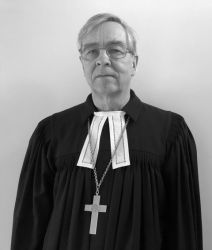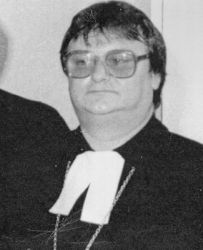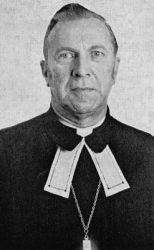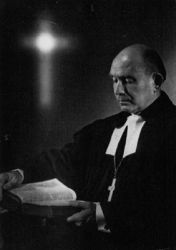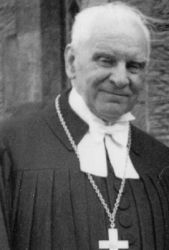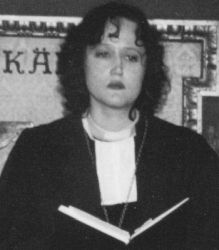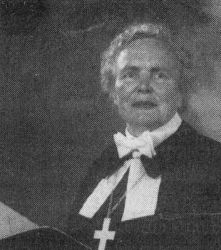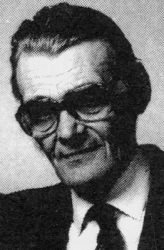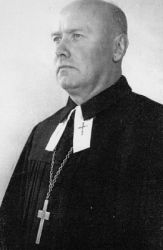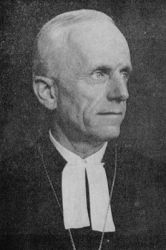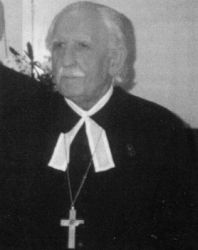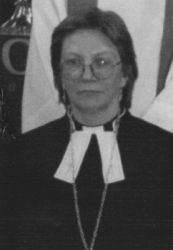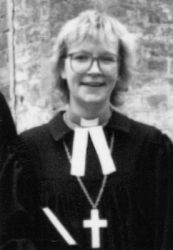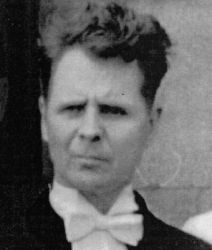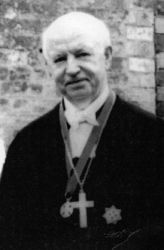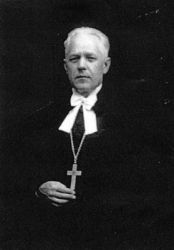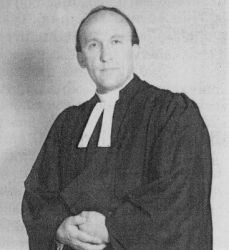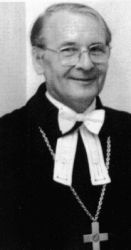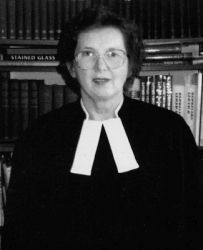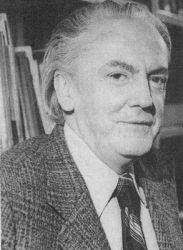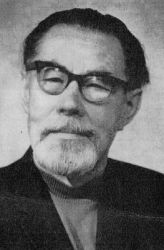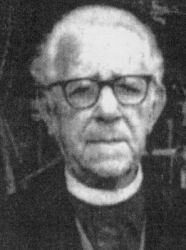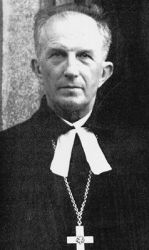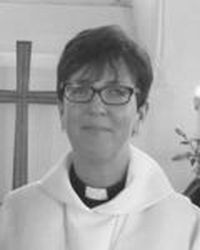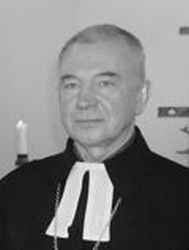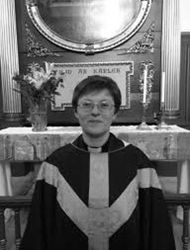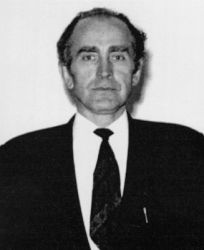The first Latvian Evangelical Lutheran church in London was founded by the Revd. Robert Slokenbergs in 1945 at the Latvian Legation. Members of the congregation were Latvian sailors, envoys, journalists and other Latvian citizens who had remained in England during the Second World War. When Latvian refugees from Germany began to arrive in the Britain, congregations were established in the work camps. Archbishop Teodors Grīnbergs played an important role during a visit in 1949. Starting in 1950, the congregations were established in Central England, East of England, South-West England, Manchester, York-Newcastle, Leeds, and Scotland. Congregations were formed by multi-group association, since most Latvians were dispersed in separate hostels and labor camps. Dean Edgars Bergs played an important role in the organization of Latvian religious life.
Latvian Evangelical Lutheran Churches in Great Britain adopted facilities and operating regulations at a synod on 3 June 1951. In the following years, the synods were held regularly every year, discussing questions relevant to the activities of the Latvian church and to the life of the congregations. In 1953, at the initiative of the envoy Kārlis Zariņš, a new testament edition edited by Dean Bertram Fedder was published.
In the 1970s religious life stagnated because of the ageing of the members of the congregations and a decline in their numbers, as well as by the general secularisation trend in Europe. An important event was the merger of the two London congregations in 1990. After the restoration of independence in Latvia, contacts with the church in Latvia were established in the homeland. A new generation of clergy came in, among them women who could not be ordained in Latvia. The shift sparked within the church by Latvia's accession to the European Union and the subsequent emigrations to Britain were significant: new members entered the existing congregations, new groups were formed. Latvian religious life became more dynamic and diverse.
Latvian Lutheran congregations in the UK
London Congregation (Londonas draudze). Founded 1945. Clergy: R. Slokenbergs, J. Gailis (1957-1964), J. Sapiets (1964-1983).
London Peace Congregation (Londonas Miera draudze). Founded 1948, Clergy: E. Bergs, R. Mužiks. Joined by the congregation of South England. Services held at Trinity Church, St. Anne and St. Agnes Church continued until 14 April 2013, then at the Swedish Church.
East of England Congregation. Founded 1948. Clergy: E. Zenitis and others in Corby (parish centre), Mansfield, Derby, Bedford, Nottingham. A church hall was constructed.
The congregation of Central England. Founded 1948. Clergy: E. Sarkanbārdis, J. Jurģis (from 1959). Based in Leicester. Groups in Birmingham, Gloucester, Coventry, Leamington Spa, Wolverhampton.
North of England Congregation (Bradford). Formed from the York and Bradford groups based in Bradford (purchase of parish house in 1951). Clergy: R. Āboliņš (1947-1955), R. Mužiks (1956), E. Sarkanbārdis (1957-1973), A. Putce.
Leeds Congregation. Founded 1949. Clergy: E. Bergmanis, A. Putce (from 1979).
Manchester Congregation. Founded 1948. Clergy: P. Namgauds, K. Zuika (1960‒1965), A. Putce (1965-1979).
Scotlan Congregation. Founded 1948, joined by Carlisle and Newcastle groups. Clergy: J. Sapiets, R. Āboliņš. Activity ceased 15 April 2007.
In 2020, there were still active congregations at the United London Latvian and Peace Congregation, the East of England Congregation, together with Derby, Nottingham, Peterborough, Corby, Manchester Congregations, West of England-Welsh Congregation with groups in Bristol and Swansea, Central England congregation with groups in Birmingham, Leicester, Straumēni (Catthorpe Manor) and Coventry; Bradford congregation.
Catholics
On 14 March 1948, a Latvian Catholic meeting was held in Leicester, and the formation of Latvian Catholic groups started. On 23 October 1948, the Latvian Catholic Society in Great Britain was founded, as well as the Latvian Catholic Student Society "Dzintars" (Amber). In the organisation of Catholic religious life, P. Cirsis and J. Savickis played an important part, as well as Bishop Boļeslavs Sloskāns, who visited in 1950 and 1955. Catholic communities were formed in London, Corby, Bradford, Nottingham, Leicester.
Orthodox
The arrival of Archpriest A. Grāmatiņš in London started the organisation of Orthodox Latvians. Four congregations were formed: in Coventry, Manchester, Bradford, London. After the death of A. Grāmatiņš , the work was continued by Propresbyter A. Cherney.
Pastors of the Latvian ev. lut. church in Great Britain
Prāvesta Ringolda Mužika 45 gadu darba jubileja.
Latvian Catholic priests in Great Britain
Pēteris Cirsis, Dean, (14.11.1915 - 25.12.1998 ). Studied theology in Austria. Just before the Second World War, he came to England, continued his studies, and receives the sacrament of the holy priesthood at Westminster Cathedral in 1942. In addition to his priest's work, he was a teacher, edited the Catholic journal "Light" and was author of several books.
Jāzeps Savickis, Dean, (14.01.1913 - 04.12.1989). Studied theology at the University of Latvia, dedicated to the priesthood in 21.07.1937. Arrived in England in 1947 and began organising Catholic groups. In 1948 he was initiator and founding leader of the Latvian Catholic Society in Great Britain. Member of the Latvian National Council in Great Britain for 14 years.
Latvian Orthodox priests in Great Britain
Aleksandrs Černejs, Proto presbyter, (12.09.1914 - 16.04.2008). Dean of the Latvian Orthodox Church, proto presbyter of the Ecumenical Throne of Constantinople.
Antonijs Grāmatiņš, Lt.-Col., Dean, (21.04.1891-16.07.1969). After serving in the Kalpaka Battalion during World War One, in parallel with the work for the British army, he focused on working in the church. In exile in Germany, he was ordained a priest, then moved to England. Organized Latvian Orthodox communities. Member of the Latvian National Council in Great Britain for 10 years. Long-time member of the Board of the Society of Latvians in Great Britain. A regular contributor to the newspaper “Londonas Avīze”.

